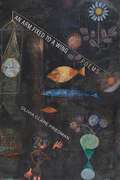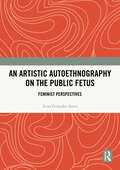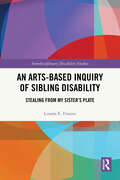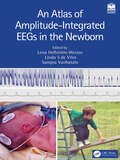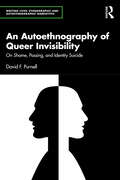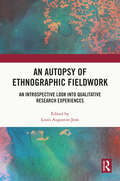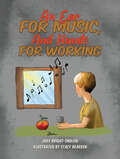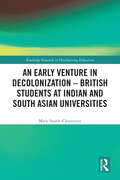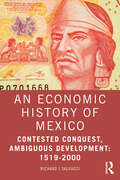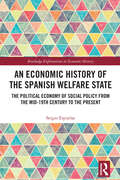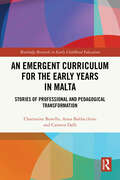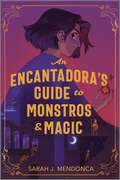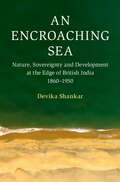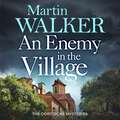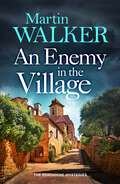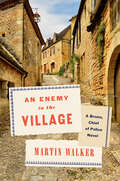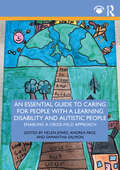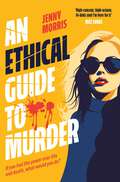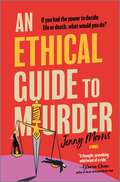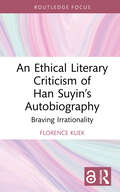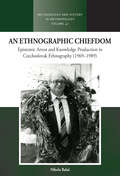- Table View
- List View
An Arm Fixed to a Wing: Poems
by Olivia Clare FriedmanOlivia Clare Friedman’s An Arm Fixed to a Wing seeks out the spiritual elements that haunt the everyday, the divine wing fastened to an earthly arm. Elegies and poems of nostalgia appear alongside pieces celebrating the speaker’s present moment, with the underlying knowledge that such moments slip past too easily. Several poems explore the theme of motherhood—the excitement and novelty, the routine and translucent sleeplessness. At the book’s center sits a sequence of narrative pieces, titled “Camera Poems,” exploring experiences of isolation, hopefulness, and self-awareness. While the poems in An Arm Fixed to a Wing acknowledge that loss is a constant, their tone is frequently wistful, evoking the desire to recover feelings of attentiveness and wonder toward one’s surroundings, both the mundane and the extraordinary.
An Artificial Intelligence Code of Conduct for Health and Medicine: Essential Guidance for Aligned Action
by The Learning Health System Series National Academy of MedicineOver the last decade, advances in artificial intelligence (AI) technologies have created transformational opportunities for health, health care, and biomedical science. While new tools are available to improve effectiveness and efficiency in myriad applications in health and health care, challenges persist, including those related to increasing costs of care, staff burnout and shortages, and the growing disease burden of an aging population. The need for new approaches to address these long-standing challenges is evident and AI offers both new hope and new concerns. An Artificial Intelligence Code of Conduct for Health and Medicine: Essential Guidance for Aligned Action presents a unifying AI Code of Conduct (AICC) framework developed to align the field around responsible development and application of AI and to catalyze collective action to ensure that the transformative potential of AI in health and medicine is realized. Designed to be applied at every level of decision making—from boardroom to bedside and from innovation labs to reimbursement policies—the publication serves as a blueprint for building trust, protecting patients, and ensuring that innovation benefits people.
An Artistic Autoethnography on the Public Fetus: Feminist Perspectives
by Anna Gonzalez SueroAn Artistic Autoethnography on the Public Fetus explores artistic work with the iconic image of the fetus and the personal consequences of the image by analyzing the so-called public fetus within a feminist approach.This book develops a deeply interdisciplinary body of research, engaging with feminist debates on reproductive technology and imagery, art theory, visual histories of anatomical imagery, cultural critiques of the myth of the artistic genius, Gestalt understandings of perception and memory, and anthropological theories of liminality. Through blurring the artistic with the scientific, it explores the potential of autoethnography to serve as a form of conscious raising through which to create new images and stories that counter the public fetus in support of reproductive autonomy and social justice.This book will be useful to feminist scholars who work with issues related to gender, reproduction, sexuality, and autoethnography. At the same time, the book will be of value to undergraduate and graduate students in gender studies as an example of how an autoethnographic process can make unrecognized experiences of gender known to a person.
An Arts-Based Inquiry of Sibling Disability: Stealing from My Sister’s Plate (Interdisciplinary Disability Studies)
by Linnéa E. FranitsThis book examines texts and other artistic products rendered by siblings of individuals with disabilities in order to interrogate the impact of disability on the identity of non-disabled siblings. This includes an arts-based analysis of the author’s own experiences as the sister of a woman with disabilities as depicted in photo essays and autoethnographic texts. By providing an alternate presentation of the topics surrounding sibling disability it gives readers a deeper and broader perspective of the lived experience of sibling disability by introducing them to some of the knowledge that is specifically, and perhaps singularly available to siblings of people with disabilities. Presenting findings from narrative analysis, visual analysis, autoethnographic and arts-based research related to sibling disability, it challenges the grand narratives that persist in many cultural products and medical discourses around sibling disability.It will be of interest to all scholars and students of disability studies, sociology, childhood studies, family studies and the arts more broadly.
An Assessment of Data, Tools, and Metrics for Equity in Decisions About Surface Transportation Investments
by Transportation Research Board National Academies of Sciences, Engineering, and Medicine Consensus and Advisory Studies Division Committee on Data, Metrics, and Analytic Methods for Assessing Equity Impacts of Surface Transportation Investments: Phase 2 Study to Support State and Local Decision MakingThe U.S. Department of Transportation and Congress should direct and support states, localities, regional planning organizations, and other recipients of federal surface transportation funds to pilot test the use of metrics for informing transportation investments aimed at addressing the needs of all people in a deliberate and equitable manner. This is among the recommendations in TRB Special Report 356: An Assessment of Data, Tools, and Metrics for Equity in Decisions About Surface Transportation Investments, from the Transportation Research Board of the National Academies of Sciences, Engineering, and Medicine. The report, called for by Congress, considers the needs of state and local jurisdictions as they strive to use their federal transportation funds to promote safe and reliable access to life needs such as housing, jobs, health care, and education, and to avoid and mitigate any adverse effects from transportation. The report’s findings and advice will also inform a follow-on National Academies’ research project to pilot test promising approaches for equity analysis.
An Assessment of Selected Divisions of the National Institute of Standards and Technology Information Technology Laboratory: Fiscal Year 2024
by Division on Engineering and Physical Sciences Laboratory Assessments Board National Academies of Sciences, Engineering, and Medicine Panel on Assessment of the National Institute of Standards and Technology (NIST) Information Technology LaboratorySince 1959, the National Institute of Standards and Technology (NIST) has annually solicited the National Academies of Sciences, Engineering, and Medicine to convene expert panels to evaluate the quality, effectiveness, and resource sufficiency of NIST’s six measurement and standards laboratories. This report provides an assessment of the NIST Information Technology Laboratory (ITL) focusing on technical programs, scientific and technical expertise portfolio, facilities, equipment, and human resources support, and program dissemination.
An Atlas of Amplitude-Integrated EEGs in the Newborn
by Lena Hellström-Westas Linda S de Vries Sampsa Vanhatalo Sonia L Bonifacio Mohamed El-Dib Kathi Salley Randall Geraldine BoylanThis new edition updates the definitive clinical atlas textbook on interpreting continuous amplitude-integrated electroencephalography monitoring in neonatal units. It presents a comprehensive instructive overview linking tracings, scans, neuroimaging, real-time tracing clips, and detailed clinical scenarios and is an invaluable guide to all those needing to learn how to use aEEG for the best and safest results. An online quiz is available to enhance training and performance.This third edition of the aEEG atlas summarizes the experience and evidence of more than 40 years of aEEG monitoring in the newborn and also addresses the development and future of brain monitoring.
An Autoethnography of Queer Invisibility: On Shame, Passing, and Identity Suicide (Writing Lives: Ethnographic Narratives)
by David PurnellThis book recounts a personal journey of self-acceptance, focusing on the author's creation and reliance of a persona (Paul D. Drevlin) as a defense mechanism against societal and familial pressures.Beginning with a childhood marked by traumatic events, the author begins his desire of invisibility, later adopting the persona of Drevlin to navigate societal expectations and challenges, including his struggles with identity, sexuality, and religious conservatism. This book explores how the persona initially provided protection, safety, and acceptance to eventual self-realization that the persona was more a prisoner than a protector.The aim of this book is to open discussion regarding the shifts in acceptance experienced by the LGBTQ+ community over the years. It underscores the importance of family (whether that be birth family or family of choice) and peer support, community acceptance, and the changing dynamics of LGBTQ+ landscapes. The book also aims to stress the significance of fostering an inclusive society and respecting the diverse identities of individuals, advocating for understanding, empathy, and collective efforts toward equality and acceptance.Suitable for students studying LGBTQ+ studies, gender studies, sociology, psychology, social work, and creative writing, this book will also appeal to non-academic readers who may find the cultural and family themes significant to their own lives.
An Autopsy of Ethnographic Fieldwork: An Introspective Look into Qualitative Research Experiences
by Louis Augustin-JeanThis edited volume presents an international collection of fieldwork experiences from every stage of the research process with a view to normalising the process of adaptation, modification, and even failure during fieldwork when circumstances interrupt the expected outcomes.This book aims to address a gap often found in methodology books by including nine full autopsy-like reflection of fieldwork experiences, selected based on researchers’ disciplines and fields, the diversity of geographical locations and their differing themes. Its chapters record a swath of experience, from choosing the research themes and hypotheses through to academic presentations and publications, shedding light on an area academic research that is often overlooked.Documenting experience from anthropologists and sociologists to political scientists and economists, the diversity of the book’s approach and its multidisciplinary focus will interest researchers, scholars, and postgraduate students from a range of subdisciplines and levels of fieldwork experience.
An Ear for Music, And Hands for Working
by Judy Bright-EnglishJust imagine being a young boy sitting behind your desk at home, and every morning you hear music and the sound of marching feet.But you&’re too short to see over the windowsill. The music passes by, and you wonder what it would be like to play with them. Then a gift from his housekeeper and some good news from his father gives this young boy a chance.
An Early Venture in Decolonization – British Students at Indian and South Asian Universities (Routledge Research in Decolonizing Education)
by Mary Searle-ChatterjeeTimely in its contribution to on-going debates on the decolonization of education, this novel volume charts the development of a scheme of postgraduate transnational education that saw British students sent to Indian and South Asian Universities while political decolonization was still ongoing.Representing the first book-length publication focused entirely on the educational effects of this aspect of the Commonwealth Scholarship and Fellowship Scheme, chapters are based on the personal narratives of 40 learners, providing a rich historical, qualitative study which sets the students’ experiences in their social and economic context. Demonstrating the changes that took place over time, chapters engage with debates about overt and implicit forms of colonial thinking, as well as discussion concerning cultural and educational decolonization within the academy. Ultimately, this compelling book demonstrates that educational decolonization goes beyond a mere awareness of imperialism and inequalities, instead reaching further towards a genuine, humanist engagement with other cultures.Offering a first-hand account of an early decolonial venture, the book will be invaluable to academics, postgraduate students and scholars interested in decolonizing and international education, as well as in South Asian Studies. Policy makers in international educational contexts may also find the volume useful.
An Economic History of India: Growth, Income and Inequalities from the Mughals to the 21st Century (Cambridge Studies in Economic History - Second Series)
by Bishnupriya GuptaThis book offers a major new economic history of India from the reign of Akbar in the sixteenth century to India's post-independence integration into the global economy. Using concepts and theories from economics and economic history alongside extensive new data, Bishnupriya Gupta builds a new framework for understanding the economic impacts and legacies of British rule. She charts India's transition from precolonial economy to colonial rule and evaluates its economic performance from a comparative perspective, particularly in the context of the Great Divergence between Europe and Asia. Finally, she examines India's post-independence economy and the evolution of social and economic inequality through to the turn of the twenty-first century. By taking a long view, the book sheds new light on the persistent effects of historical institutions as well as the impacts of policy-driven changes. It will be essential reading for anyone seeking to understand the long-run evolution of the Indian economy.
An Economic History of Mexico: Contested Conquest, Ambiguous Development: 1519-2000
by Richard J SalvucciAfter a turbulent modern history of conquest and colonialism, Mexico has developed as an economy that may be emerging but still displays significant levels of poverty, particularly in relation to its neighbor to the north, the United States.Drawing on archival data, decades of new Mexican historiography, and considering issues of political economy, this book explores how Mexico ended up in the relative economic position that it did. Beginning with Hernán Cortés and the invention of the Conquest of New Spain, it explores the economic history of Mexico through the lens of political economy, incorporating environment and demography, politics and power, and industrialization and inequality. The aftermath of the Conquest brought about a complete restructuring of the economy as a result of death from disease, the introduction of European-style agriculture, and a more intensive exploitation of the peasantry. The eighteenth and nineteenth centuries saw “reform” followed by a series of crises and rebellions under which sustained economic growth was impossible. Globalization and the expansion of agricultural exports provided some opportunities in the late nineteenth and twentieth centuries, but they failed to provide the booming rural population with a sustainable means of supporting domestic demand. The so-called Mexican Miracle—the period of rapid growth in the 1950s, 1960s, and early 1970s—disguised a failure to address the economic inequality embedded since the colonial period. As this book clearly demonstrates, this inequality was sometimes challenged in Mexican history but never decisively addressed, let alone reversed.This accessible and engaging book is vital reading for students and scholars of the history of Mexico and Latin America and those interested in economic development in historical perspective.
An Economic History of the Spanish Welfare State: The Political Economy of Social Policy from the Mid-19th Century to the Present (Routledge Explorations in Economic History)
by Sergio EspuelasThis monograph analyses the evolution of the welfare state in Spain from qualitative and quantitative perspectives. It basically relies on estimates of public social spending from 1850 to the present and offers comparisons with the rest of Europe.As a whole, the volume sheds light on the historical, political, and economic conditions at play during the relatively late development of the Spanish welfare state. Three key driving factors are explored: the political regime, social inequality, and Spain’s exposure to international markets. While economic backwardness and demographic factors explain part of the story, Espuelas demonstrates that inequality explains much of the pre-1936 gap; the lack of democracy and the Franco dictatorship were crucial up to the 1970s, and globalization, rather than having a clear positive or negative effect, has mainly influenced the way social policy is financed.This volume will be of interest to advanced students and researchers of economic history, welfare states, European history, and social policy.
An Emergent Curriculum for the Early Years in Malta: Stories of Professional and Pedagogical Transformation (Routledge Research in Early Childhood Education)
by Carmen Dalli Charmaine Bonello Anna BaldacchinoThis book charts the firsthand experiences and challenges faced by Maltese early childhood educators in the implementation of a novel approach to the curriculum: the replacement of a prescriptive curricula with one co-constructed by the educator and the child.Chapters provide seven contextualised, inspiring narratives of how the ‘emergent curriculum’ approach was implemented, received, and reflected upon within Maltese educational settings, ranging from childcare (0–3 years), kindergarten (3–5 years), and early primary (5–7 years). Packed with practical guidance along with on-the-ground commentary, this volume showcases the pedagogical and professional transformation of these educators, informing and encouraging reflection as well as inspiring others on a global scale. Challenging the established modes and traditions of pedagogical best practice, this book ultimately fills a gap in research on how educators in diverse local contexts and cultures can embrace the global concept of the ‘emergent curriculum’ within their own practice and settings.Providing pedagogical and professional insights for early years educators in similar contexts internationally, the book will be of interest to researchers and early childhood educators, as well as curriculum designers and policy makers interested in how the curriculum can take shape in different cultures and contexts.
An Encantadora's Guide to Monstros and Magic
by Sarah J. MendoncaEncanto meets Oceans 8 in this middle-grade fantasy-adventure, set in a Portuguese-inspired world, following a tween girl who joins a notorious band of thieves to steal a priceless jewel and discovers corruption that must be stopped.Rosa Coelho has spent her whole life hunting monstros, wandering the city streets with her best friend Tiago, and dreaming of a better life for herself and her grandmother. And in a society that favors the rich and educated, every piece of knowledge comes with a hefty price, even the most basic books Rosa&’s family needs to trap monstrous.So when the powerful Ministério dos Monstros threatens her family&’s struggling Encantadora shop, Rosa only has two weeks to scrape together the money for their debts. It seems like an impossible task…until Rosa tricks her way onto an infamous thief crew as their magical safecracker.Thrust into the world of high class luxury and betrayal, Rosa is pulled into a scheme with the highest possible stakes: stealing from the Ministry itself. She must learn to trust her magical abilities and her crew—for if the heist goes wrong, everything she loves is forfeit.
An Encroaching Sea: Nature, Sovereignty and Development at the Edge of British India 1860–1950 (Cambridge Oceanic Histories)
by Devika ShankarEcological and political instability have time and again emerged as catalysts for risky development projects along India's south-west coastline. Devika Shankar probes this complicated relationship between crisis and development through a focus on a port development project executed in Cochin in the first quarter of the twentieth century amidst significant political and ecological uncertainty. While ecological concerns were triggered by increasing coastal erosion, a political crisis was precipitated by a neighbouring princely state's unprecedented attempt to extend its sovereignty over the British port. This integrative environmental, legal, and political history brings together the history of British India and the princely states to show how these anxieties ultimately paved the way for an ambitious port development project in the final years of colonial rule. In the process it deepens our understanding of environmental transformations and development in modern South Asia and the uneven nature of colonial sovereignty.
An Enemy in the Village (The Dordogne Mysteries #18)
by Martin WalkerFrance's favourite country policeman investigates a suicide and gets involved in a tricky local issue in the latest adventure in this ever popular and bestselling mystery series.'FRENCH TOURISM SHOULD RAISE A GLASS TO WALKER'S DORDOGNE MYSTERIES' Daily MailBruno Courrѐges is chief of police of the lovely Dordogne town of St Denis with a remit that covers the beautiful valley of the river Vézѐre. One autumn morning he comes across an abandoned car parked near a local beauty spot. Inside is a dead woman, Monique, an apparent suicide resulting from depression. But there are circumstances surrounding the death that raise Bruno's suspicions, particularly when disputes arise surrounding her Will. At the same time, Bruno makes the mistake of interfering in a local marital dispute. Deputy mayor Xavier has been playing away and finds himself evicted from the family home. Old controversies about deer culls take on new life and then a second campaign begins, stating that Bruno is less of a village copper and more of a secret policeman, whose main job is working for French intelligence. Some of the ammunition for this attack, Bruno learns, comes from Xavier, who sees this as a way to topple Bruno and the mayor and succeed to the mayor's job himself. Suddenly Bruno's shiny reputation is looking a little tarnished as he battles to save his name and answer the questions surrounding Monique's suicide.
An Enemy in the Village (The Dordogne Mysteries #18)
by Martin WalkerFrance's favourite country policeman investigates a suicide and gets involved in a tricky local issue in the latest adventure in this ever popular and bestselling mystery series.'FRENCH TOURISM SHOULD RAISE A GLASS TO WALKER'S DORDOGNE MYSTERIES' Daily MailBruno Courrѐges is chief of police of the lovely Dordogne town of St Denis with a remit that covers the beautiful valley of the river Vézѐre. One autumn morning he comes across an abandoned car parked near a local beauty spot. Inside is a dead woman, Monique, an apparent suicide resulting from depression. But there are circumstances surrounding the death that raise Bruno's suspicions, particularly when disputes arise surrounding her Will. At the same time, Bruno makes the mistake of interfering in a local marital dispute. Deputy mayor Xavier has been playing away and finds himself evicted from the family home. Old controversies about deer culls take on new life and then a second campaign begins, stating that Bruno is less of a village copper and more of a secret policeman, whose main job is working for French intelligence. Some of the ammunition for this attack, Bruno learns, comes from Xavier, who sees this as a way to topple Bruno and the mayor and succeed to the mayor's job himself. Suddenly Bruno's shiny reputation is looking a little tarnished as he battles to save his name and answer the questions surrounding Monique's suicide.
An Enemy in the Village: A Bruno, Chief of Police Novel (Bruno, Chief of Police Series)
by Martin WalkerA real estate agent&’s death sends shockwaves through the idyllic town of St. Denis, leading Bruno, Chief of Police, to suspect that there&’s more to this tragedy than meets the eye.When Bruno stumbles upon a motionless figure in a car parked at a scenic overpass on the ridge of the Vézère valley, he&’s ready to investigate. Inside, he finds a suicide note and the dead body of Monique, a successful businesswoman who rented châteaus to wealthy expats. It seems like an open-and-shut case. But Bruno can&’t shake the suspicion that something sinister lurks underneath this tidy narrative. After he delivers Monique&’s final messages to those most important to her, malicious gossip about Bruno begins to spread through the village. One thing leads to another, and soon Bruno faces pressure to resign from the job. Despite this disturbing turn of events, Bruno remains Bruno, never one to turn down a fine meal with good company in the French countryside. In the course of inquiry, he meets Laura—and her dog, which happens to be the same breed as his beloved basset hound. As sparks fly and Bruno realizes just how much he has at stake, he races to find out what really happened to Monique, before he loses his badge, his new love—or something even worse.
An Essential Guide to Caring for People With a Learning Disability and Autistic People: Enabling a Cross-Field Approach.?
by Andrea Page Helen Jones Samantha SalmonThis essential text presents the core information that all nursing students and apprentices along with other key health and social care professions, regardless of field, need to know about caring for people with a learning disability and autism. It outlines some of the key challenges faced by people with a learning disability and autism, and ways in which good care can improve their quality of life. People with a learning disability and autism are more likely to need support with aspects of everyday life, be marginalised within society, including within health and social care, and die younger than the rest of the population. They are also more likely to have additional communication needs, sensory processing difficulties and require significant support to access healthcare as well as other opportunities across the course of their lives.This innovative text highlights the core knowledge that all health and social care professionals need and emphasises the benefits of learning across different fields of practice. It presents information about common conditions, key skills, and where a standard approach may need to be changed when caring for a person with a learning disability and autistic people. It demystifies key issues and commonly misunderstood concepts and topics including distressed behaviours, consent and reasonable adjustments. The book also focuses on addressing health inequalities, improving communication, understanding mental capacity and presents case studies throughout to illustrate how care can and should be delivered.Written for all who aspire to understand the needs of these individuals and to deliver care as effectively as possible, this collaborative text brings together the voices of services users and their families and carers, with those of nurses, other health professionals, lecturers, and nursing students and apprentices.
An Ethical Guide To Murder: The darkly twisted debut thriller of the year
by Jenny Morris'[A] belting debut . . . This is high-concept, high-octane, hi-jinks and I'm here for it' Maz EvansHow to Kill Your Family meets The Power in this entertaining and thought-provoking read, that asks: If you had the power between life and death, what would you do? Thea has a secret. She can tell how long someone has left to live just by touching them. Not only that, but she can transfer life from one person to another – something she finds out the hard way when her best friend Ruth suffers a fatal head injury on a night out. Desperate to save her, Thea touches the arm of the man responsible when he comes to check if Ruth is all right. As Ruth comes to, the man quietly slumps to the ground, dead. Thea realises that she has a godlike power: but despite deciding to use her ability for good, she can&’t help but sometimes use it for her own benefit. Boss annoying her at work? She can take some life from them and give it as a tip to her masseuse for a great job. Creating an &‘Ethical Guide to Murder&’ helps Thea to focus her new-found skills. But as she embarks on her mission to punish the wicked and give the deserving more time, she finds that it isn&’t as simple as she first thought. How can she really know who deserves to die, and can she figure out her own rules before Ruth&’s borrowed time runs out? &‘Relatable, poignant, and filled with unexpected twists, An Ethical Guide to Murder is near-impossible to put down. I was hooked all the way up to the ending, which I can't stop thinking about. A must-read for 2025&’ Jenny Hollander &‘An Ethical Guide to Murder is a fabulous book! Jenny Morris has taken the "with great power comes great responsibility" concept and applied it to someone who struggles to be responsible for her own laundry. Thea is a relatable, messy character whose trials and tribulations kept me laughing all the way to the emotional gut punch. What a marvellous debut!&’ Alice Bell &‘An Ethical Guide to Murder is the best type of book – one that&’s as entertaining as it is thought-provoking. With Thea, Jenny Morris has created one of the most interesting characters that I&’ve read in a long time&’ Kellye Garrett
An Ethical Guide to Murder: A Novel
by Jenny MorrisThea has a secret. She can tell how long someone has left to live just by touching them. Not only that, but she can transfer life from one person to another—something she finds out the hard way when her best friend, Ruth, suffers a fatal head injury on a night out. Desperate to save her, Thea accidentally kills the man responsible and lets his life flow directly into Ruth. Thea comes to understand that she has a godlike power, but how to use it quickly becomes a question of self-control. Is it really so wrong to take a little life from a bad person—say, a very annoying boss—and gift it to someone who's truly good? Realizing she needs to harness her newfound skills, Thea creates an Ethical Guide to Murder. But as she embarks on her mission to punish the wicked and give the deserving more time, she finds good and bad aren't as simple as she first thought. How can she really know who deserves to live and die, and can she figure out her own rules before Ruth&’s borrowed time runs out?
An Ethical Literary Criticism of Han Suyin’s Autobiography: Braving Irrationality (Interdisciplinary and Transcultural Approaches to Chinese Literature)
by Florence KuekHan Suyin (1916/1917–2012) became a household name when Love is A Many-Splendored Thing, the Hollywood rendition of her novel won several awards in 1956. The study of Han Suyin went out of fashion for a while, but it has recently been revitalised, especially in Singapore and Malaysia. Kuek pays attention to The Crippled Tree autobiographical series, delineating her two-track narrative of her family saga against the backdrop of 20th century China.Different from the earlier studies on Han Suyin that employed perspectives from postcolonialism, feminism, and new historicism, this book examines Han Suyin’s autobiography through the lens of ethical literary criticism (ELC), paying attention to the ethical lines and knots embedded in her series. Using ELC, an apolitical literary analysis approach, this book uncovers multiple layers of meaning and reveals Han Suyin’s life trajectory which draws attention to China’s difficult path of modernisation in the past century. The insights gleaned from this book shed light on Han Suyin’s life accomplishments in the face of great adversities and challenges.This is a valuable book that will enlighten literary critics on critical approaches to autobiography and those interested in understanding the development of modern China through the words of a proud Chinese-Eurasian writer living in the era.
An Ethnographic Chiefdom: Epistemic Arrest and Knowledge Production in Czechoslovak Ethnography (1969–1989) (Methodology & History in Anthropology #49)
by Nikola BalašThe Czechoslovak academic discipline called ‘Ethnography and Folklore Studies’ was impacted and influenced by the daily realities of state socialism in 1969–1989. This book examines the role of the planned economy, Marxist–Leninist ideology, disciplinary hierarchies and clientelist networks, ultimately showing how state socialist features together brought about the discipline’s epistemic stalling. It offers a fresh perspective on the long-standing debates purporting to capture the differences between the Central and Eastern European tradition of ethnology and Western sociocultural anthropology.
